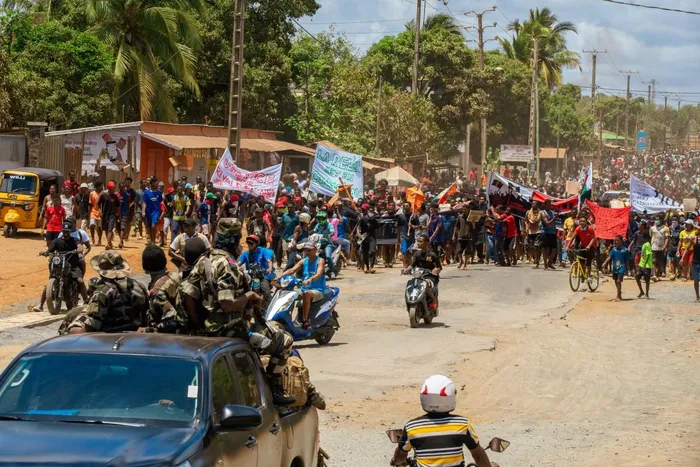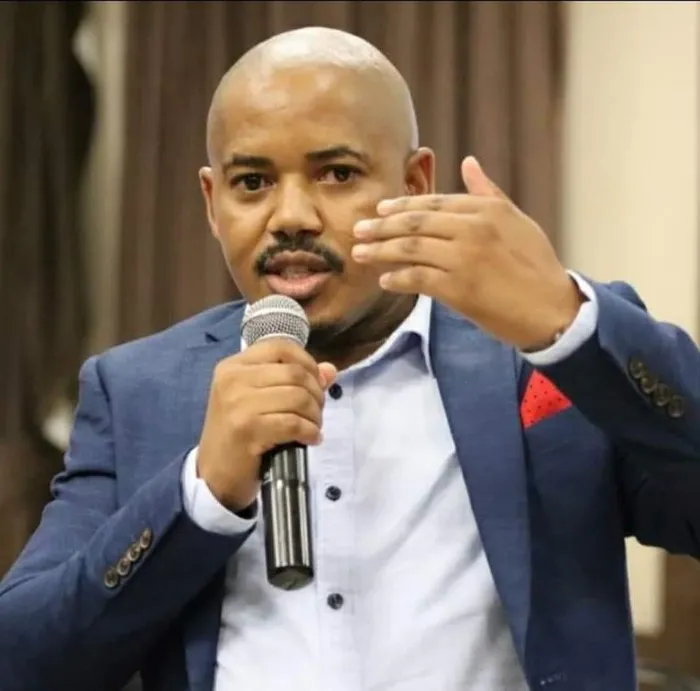
Security forces stand guard as anti-government protesters march during a demonstration against the government in Antsiranana on October 4, 2025. Supporters and opponents of Madagascar's government were called to demonstrate in the capital Saturday, as security forces erected roadblocks following more than a week of deadly unrest. Inspired by youth-led movements in Nepal and Indonesia, the protests have tapped into widespread frustration over governance, with demonstrators calling for President Andry Rajoelina to step down.
Image: FTIA / AFP
On September 25, 2025, the youth of Madagascar, known as ‘Gen Z Madagascar’, organised an anti-government mass protest via social media. This youth-led demonstration initially focused on demanding the provision of water and electricity. A few days later, other issues such as poverty, the high cost of living, corruption, nepotism, and limited access to higher education were also brought up.
The protesters ultimately called for the resignation of Andrey Rajoelina, the President of Madagascar. A week later, the widespread protest was joined by students and trade unions. Over the past weekend, soldiers from the military unit of the Army Personnel Administration Centre (CAPSAT), led by Colonel Michael Randrianirina, expressed their support for the protest against the government. Apparently, some police officers also became the latest group to back the youth-led demonstration.
In his strategy to end the mass protests and appease the demonstrators, President Rajoelina decided to instruct the police and military to forcefully suppress the protest, and he reshuffled his cabinet. The clashes between the protesters and security forces led to the deaths of more than 22 people, and more than 100 people were injured.
However, this did not cause the protesters to relent from their demands. As tensions rose, Rajoelina called for dialogue, which was ignored. Once again, when the ousted Malagasy President realised that the soldiers planned to seize power through parliamentary impeachment and a coup d’état, he announced his decision to dissolve the national assembly.
Media reports indicate that Rajoelina has been rescued and supported by the French government, which colonised this Indian Ocean nation (Madagascar) from 1896 until 1960. Although the French government denies the allegation of his rescue, the story appears to be gaining ground in the broader media landscape. It is also alleged that Rajoelina has French citizenship, which justifies his rescue.
Unfortunately, on Tuesday, the military announced its decision to take over the government and dissolved certain institutions, including the constitutional court and the independent electoral commission, among others. On Wednesday, Colonel Randrianirina declared himself the president of the country and is waiting to be officially sworn in.
The military has further publicly stated that it will announce the civilian transitional government within a few days, which will, over a period of two years, lead the country to general elections in 2028.
However, it is essential to note that since Madagascar gained independence from France in 1960, it has experienced more coups than democratically elected governments. Critically, there appears to be a missing voice that could contextualise the protesters' demands and the recurrence of coups within an anti-colonial framework, placing Madagascar within the history of decolonial struggles in Africa.
In its quest to colonise Madagascar, France declared war on and defeated the indigenous kingdom of Merina in 1883. More than a decade later, it officially colonised the island. Afterwards, the French government closed the schools that were administered by the indigenous people of the Betsiloe and Merina Kingdoms and replaced them with an education system and institutions that abolished and destroyed indigenous education and languages. This was part of a nefarious agenda to destroy the rich culture and heritage of the Malagasy people. Ngugi wa Thiong'o better explains this catastrophic event in his book ‘Decolonising the Mind’.
After that, a policy of forced labour and resource exploitation was introduced by the French government in the country. Today, Madagascar has Africans who see themselves more as Europeans than as Africans. This shows the extent to which colonialism has successfully distorted African history and eradicated African rich culture and heritage; therefore, young Pan African anthropologists and sociologists must rise in Madagascar and everywhere in Africa to research and rewrite the African history and re-position the current protests and coups in Madagascar within the critical analysis of the legacy and impact of colonialism and decolonial theory.
The sad reality is that the legacy of the colonial system of governance still influences the political and socio-economic system of the so-called post-colonial period in Madagascar. For example, the French policy of resource exploitation ensured that resources such as Vanilla, coffee, cloves and others were exploited and exported to France. After more than six decades of independence, Madagascar still essentially has an export-led economic policy. Essop Paha correctly argues that, before the arrival of the colonisers in Africa, the “land and mineral resources beneath the soil belonged to the indigenous communities”.
Madagascar produces and exports raw materials such as Nickel, Cobalt, Cloves, Coffee, Vanilla, Prawns, and Shrimps mainly to European countries. Thereafter, it imports processed and finished products that are very expensive for the poor and working-class citizens. This unfortunate situation reminds us of Kwame Nkrumah’s views in his 1963 book ‘Africa must unite’.
He argues that it cannot be that Ghana, a country that was the second largest producer and exporter of Cocoa, has no single factory that uses cocoa to produce coffee and chocolate. Instead, it exports raw cocoa and imports coffee and chocolate as finished products.
President Rajoelina ascended to power in 2009 after his predecessor, Marc Ravalomanana, was ousted through a military coup supported by the same CAPSAT unit. He served as a transitional president until 2013; however, in 2018 and 2023, respectively, he was elected President of the country and remained in office until last week. He promised the citizens to reduce the export-driven economy by strengthening the local economy through his policy of ‘One District, one Factory’, unfortunately he failed to dismantle the colonial economic system that continues to benefit France and other European countries at the expense of more than 75% of the Malagasy population that lives below the poverty line and with only 39% of the population having access to electricity and poor provision of clean water (the global economy, (2023).
Since more than 75% of the population lives below the poverty line, it is possible that those with access to electricity struggle with affordability due to the country's high level of poverty. It is difficult for one to comprehend that a country like Madagascar, which produces essential minerals such as nickel and cobalt, the minerals that play a crucial role in the fourth industrial revolution and artificial intelligence. Those minerals are used to manufacture electronic devices, renewable energy and stainless steel.
Indeed, Madagascar needs visionary, ethical, and innovative Pan-African leadership that can industrialise and prudently manage state resources to ameliorate the people’s living conditions through the provision of water, electricity and much-needed services, including the job creation and combating corruption.
To have a better understanding of the socio-economic and political problems that are bedevilling Madagascar, one needs to apply critical development theories, such as dependency theory and others, because this dependency theory assumes that Africa’s problems are created by both internal issues of bad leadership, corruption, lack of political will, ethnicity, weak institutions, etc., as well as external influence of neo-colonial interference, as opposed to the modernisation theorists who want us to believe that liberal democracy, imperialism and colonialism are the best form of governance, and the underdevelopment of Africa should be squarely attributed to the internal challenges.
Lastly, citizens should seize this moment to foster an inclusive and decolonial dialogue aligned with the African Union’s aspirations five and six, which focus on building ‘Africa with a strong cultural identity’, shared heritage, and values. The continent whose developments and agenda are driven by Africans, leveraging the potential and capabilities of its people. An African-led solution to coups and the challenges of peace and security is much-needed in Madagascar.
The African Union (AU) has decided to suspend the membership of a country, arguing that it does not support the unconstitutional and unelected government. I think the AU needs to critically and deeply analyse the problem; merely suspending membership and calling for inclusive dialogue is not sufficient.

On September 25, 2025, Madagascar's youth, known as 'Gen Z Madagascar', ignited a powerful anti-government protest via social media, demanding essential services and justice. As the movement grows, it uncovers deeper issues of corruption and colonial legacy, calling for a reevaluation of Madagascar's political landscape.
Image: Supplied
* Orapeleng Matshediso is a master’s graduate of Pan African Development Studies and a Research Fellow at the University of Johannesburg (Institute for Pan African Thought and Conversation).
** The views expressed do not necessarily reflect the views of IOL or Independent Media.
Related Topics: